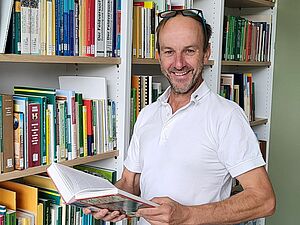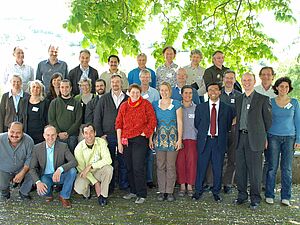"We were able to have an impact on the global organic movement"
50th anniversary voices
Members of the International Round Table on Organic Agriculture & Climate Change (RTOACC) during the kick-off meeting in Frick in May 2010 (Andreas Gattinger is the second person from left in the front row). (Photo: FiBL, Thomas Alföldi)
Andreas Gattinger worked at FiBL in Frick from February 2010 to March 2017, where he helped to establish the field of climate and organic agriculture. Since April 2017, he has held the professorship for organic agriculture with a focus on sustainable soil use at Justus Liebig University Giessen. He is also a member of the board of FiBL Germany and on the Scientific Advisory Board of the Julius Kühn Institute.
How did you come to FiBL?
I have been in contact with FiBL professionally for almost 30 years now, especially with my colleagues Andreas Fliessbach and Paul Mäder. However, the whole thing really took off in 2009 when the former FiBL Director Urs Niggli asked me to be a consultant for an upcoming project in Abu Dhabi and a short time later to head the group “climate”. At that time, I was still working as a project manager for the start-up Geohumus International in Frankfurt and had failed in my mission to green the deserts on the Arabian Peninsula with a synthetic soil granulate. So, the job offer from FiBL came just at the right time. At first, however, I could not imagine how it would work with my family and farm being in Selters/Germany. FiBL, and above all Urs Niggli, offered me a hybrid solution of working both from home and in the office, which appealed to me from the start.
What were the highlights of your work at FiBL?
My employment was also tied to the expectation of implementing groundbreaking projects in Abu Dhabi and Saudi Arabia. However, for many reasons, this did not come true. Rather, I felt something else right from the start: when I began my activities in the late winter of 2010, i. e. after the "failed" climate summit in Copenhagen, a spirit of optimism could be felt at FiBL and within the organic community. This inspired the newly launched CaLaS project (Carbon Credits for Sustainable Landuse Systems) to undertake global meta-studies on the climate impacts of organic agriculture. And with the newly founded International Round Table of Organic Agriculture on Climate Change (RTOACC) – of which I was the spokesperson from 2010 to 2017 – to impact the global organic movement. We succeeded, just as we succeeded in working together with Bio Suisse, the umbrella organisation of Swiss organic farmers, from 2010 onwards to produce a number of climate workshops, studies and fact sheets for practical use and to win over Swiss organic farms early on in terms of climate protection. During my time, I was also able to help four young scientists successfully complete their doctorates in the field of soil and climate, three of whom are now permanent members of FiBL's scientific staff. At the end of my seven years at FiBL, I also had a gratifying track record of the equivalent of 5.9 million euros in third-party funding and 24 peer-reviewed publications. In addition, I was appointed Professor of Organic Agriculture at the Justus Liebig University in Giessen. I have FiBL to thank for this final career step.
What are your wishes for FiBL?
I would like FiBL to continue to be and be seen as an attractive and inspiring, culturally diverse place of work and think tank. In addition to all the many projects, it is important to have the freedom for good cooperation and critical reflection, from which new things can emerge. It would also be nice if FiBL could revive the Round Table of Organic Agriculture and Climate Change, because the climate issue is more current than ever.





